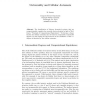Free Online Productivity Tools
i2Speak
i2Symbol
i2OCR
iTex2Img
iWeb2Print
iWeb2Shot
i2Type
iPdf2Split
iPdf2Merge
i2Bopomofo
i2Arabic
i2Style
i2Image
i2PDF
iLatex2Rtf
Sci2ools
112
click to vote
MCU
2004
2004
Universality and Cellular Automata
The classification of discrete dynamical systems that are computationally complete has recently drawn attention in light of Wolfram's "Principle of Computational Equivalence". We discuss a classification for cellular automata that is based on computably enumerable degrees. In this setting the full structure of the semilattice of the c.e. degrees is inherited by the cellular automata. 1 Intermediate Degrees and Computational Equivalence One of the celebrated results of recursion theory in the 20th century is the positive solution to Post's problem: there are computably enumerable sets whose Turing degree lies strictly between , the degree of any recursive set, and , the degree of the Halting set or any other complete computably enumerable set. The result was obtained independently and almost simultaneously by R. M. Friedberg and A. A. Muchnik, see [8, 14]. The method used in their construction of an intermediate degree is remarkable since it departs significantly fr...
Related Content
| Added | 31 Oct 2010 |
| Updated | 31 Oct 2010 |
| Type | Conference |
| Year | 2004 |
| Where | MCU |
| Authors | Klaus Sutner |
Comments (0)

